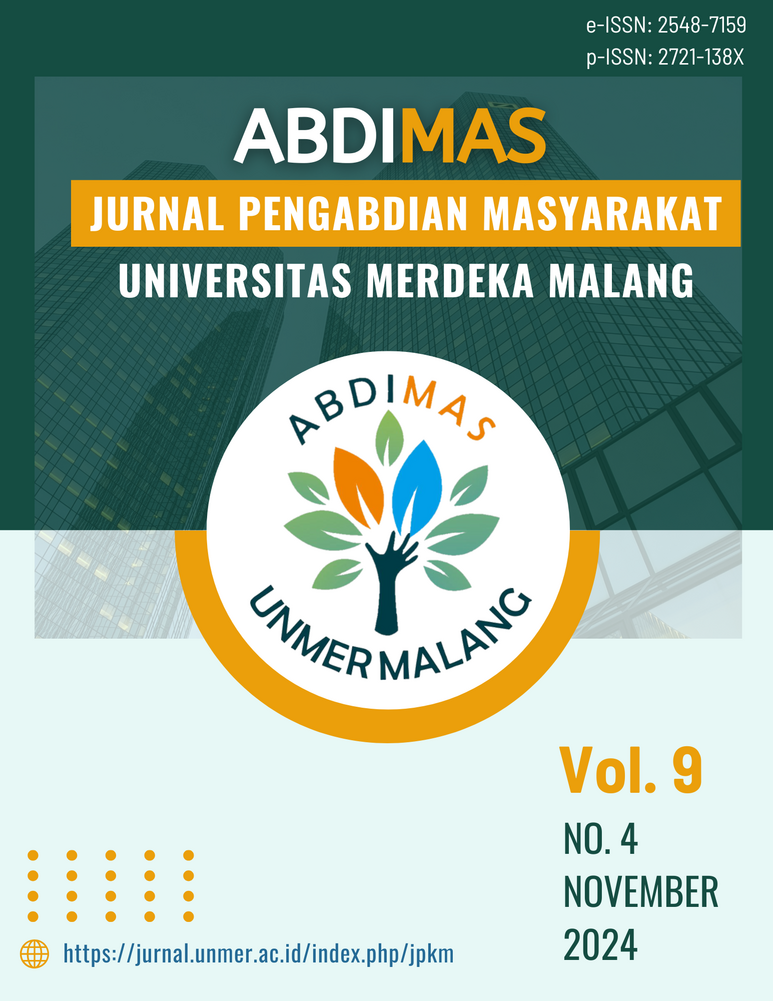TeknoMatika: Technology and product differentiation training to improve mathematics teachers' competence in Pangandaran
DOI:
https://doi.org/10.26905/abdimas.v9i4.14139Keywords:
Differentiated instruction, Learning media development, Mathematics education, Product differentiation, Student learning styles, Technology-based trainingAbstract
This community service program was implemented to address the challenges faced by mathematics teachers in applying differentiated instruction. The program aimed to enhance teachers' competencies in implementing differentiated learning and integrating technology as a teaching aid in mathematics. The training focused on improving teachers' understanding of differentiated instruction, particularly in mathematics education, and equipping them with the skills to utilize technology in the classroom. The methods used included socialization, training, technology implementation, mentoring, and program sustainability. Results showed that 88.2 percent of teachers required technology training, and 80.64 percent expressed interest in participating. Training evaluations revealed an improvement in teachers’ ability to identify students' learning styles and develop technology-based learning media. Teachers reported that Kodular facilitated the creation of interactive and student-centered learning tools. The program successfully enhanced teaching effectiveness, student engagement, and teacher creativity, despite technical challenges such as internet connectivity issues. The TeknoMatika Training has the potential to serve as a model for teacher competency development in other regions, contributing significantly to technology-based educational innovation.
Downloads
References
Amalia, K., Rasyad, I., & Gunawan, A. (2023). Pembelajaran berdiferensiasi sebagai inovasi pembelajaran. Journal of Education and Teaching Learning (JETL), 5(2), 185-193. https://doi.org/10.51178/jetl.v5i2.1351
Arochman, T., & Fortinasari, P. B. (2024). Implementation of technology-based learning by pre-service teachers during teaching practice program. Premise: Journal of English Education and Applied Linguistics, 13(1), 126-145. http://dx.doi.org/10.24127/pj.v13i1.8988
Azimah, I., & Sujannah, W. D. (2024). The effect of differentiated learning on EFL students’ reading skills. Didaktika: Jurnal Kependidikan, 13(1), 937-946. https://doi.org/10.58230/27454312.473
Bustari, M. (2023). Peluang dan tantangan implementasi Kurikulum Merdeka di Sekolah Alam Bukittinggi. ResearchGate, 1–9. https://doi.org/10.13140/RG.2.2.21341.69604
Cardino Jr, J. M., & Cruz, R. A. O. D. (2020). Understanding of learning styles and teaching strategies towards improving the teaching and learning of mathematics. LUMAT: International Journal on Math, Science and Technology Education, 8(1), 19-43. https://doi.org/10.31129/LUMAT.8.1.1348
Chikwaka, M., Ahmad, D., & Mohebi, L. (2024). Technology-based teaching. In Digital Learning: Trends and Challenges in Education (Issue January). Eureka Publications.
Fitriyah, F., & Bisri, M. (2023). Pembelajaran berdiferensiasi berdasarkan keragaman dan keunikan siswa sekolah dasar. Jurnal Review Pendidikan Dasar: Jurnal Kajian Pendidikan Dan Hasil Penelitian, 9(2), 67-73.
Himmah, F. I., & Nugraheni, N. (2023). Analisis gaya belajar siswa untuk pembelajaran berdiferensiasi. Jurnal Riset Pendidikan Dasar (JRPD), 4(1), 31-39. https://doi.org/10.30595/jrpd.v4i1.16045
Hudjimartsu, S. A., Prayudyanto, M. N., Permana, S., & Heryansyah, A. (2022). Peluang dan tantangan implementasi Merdeka Belajar Kampus Merdeka (MBKM) di Fakultas Teknik dan Sains UIKA BOGOR. Educate: Jurnal Teknologi Pendidikan, 7(1), 58-70. https://doi.org/10.32832/educate.v7i1.6245
Majdi, M. (2023). Inovasi Pembelajaran Abad 21: Peluang dan tantangan implementasi Kurikulum Merdeka Belajar di Kampus Merdeka Belajar pada STIT Buntet Pesantren Cirebon. JIECO: Journal of Islamic Education Counseling, 3(1), 12-25. https://doi.org/10.54213/jieco.v3i1.254
Maulidia, F. R., & Prafitasari, A. N. (2023). Strategi pembelajaran berdiferensiasi dalam memenuhi kebutuhan belajar peserta didik. ScienceEdu, 55-63. https://doi.org/10.19184/se.v6i1.40019
Nurjanah, F., & Yuli Suprihatin, S. E. (2023). The development of Android-based learning media using Kodular in making suit patterns subject. Jurnal Pendidikan Vokasi, 13(3), 232-245. https://doi.org/10.21831/jpv.v13i3.54542
Nurlatifah, A., & Munandar, K. (2024). Penerapan pembelajaran berdiferensiasi berdasarkan gaya belajar peserta didik. Jurnal Teknologi Pendidikan, 1(3), 1-7. https://doi.org/10.47134/jtp.v1i3.87
Putratama, H., Dewi, D. D., Hadi, S., & Suryani, M. (2023). Aplikasi pengukuran aktivitas pengguna dalam menjalankan program komputer menggunakan eye tracker. Jurnal RESTIKOM: Riset Teknik Informatika dan Komputer, 5(3), 282-298. https://doi.org/10.52005/restikom.v5i3.163
Rahman, A., Heryanti, L. M., & Ekanara, B. (2019). Pengembangan modul berbasis education for sustainable development pada konsep ekologi untuk siswa kelas X SMA. Jurnal Eksakta Pendidikan (JEP), 3(1), 1-8. https://doi.org/10.24036/jep/vol3-iss1/273
Yunianta, T. N. H., Herman, T., Al Wizhar, B., & Kurniawan, M. A. F. (2023). Development of mathematics e-module using kodular and flipbook for junior high school students: Differences. Jurnal Didaktik Matematika, 10(1), 1-16. https://doi.org/10.24815/jdm.v10i1.29730
Zananda, T. F., & Fadli, M. F. (2024). Using technology to improve teaching and studying literacy. Enrich: Jurnal Pendidikan, Bahasa, Sastra dan Linguistik, 5(1), 36-44. https://doi.org/10.36982/jge.v8i1.956
Downloads
Published
How to Cite
Issue
Section
License
Copyright (c) 2024 Abdimas: Jurnal Pengabdian Masyarakat Universitas Merdeka Malang

This work is licensed under a Creative Commons Attribution-ShareAlike 4.0 International License.
Authors who publish with this journal agree to the following terms:
- Copyright of the published articles will be transferred to the journal as the publisher of the manuscripts. Therefore, the author confirms that the copyright has been managed by the journal.
- Publisher of Abdimas: Jurnal Pengabdian Masyarakat Universitas Merdeka Malang is University of Merdeka Malang.
- The copyright follows Creative Commons Attribution-ShareAlike License (CC BY SA): This license allows to share, copy, and redistribute the material in any medium or format, adapt, remix, transform, and build upon the material, for any purpose, even commercially.





